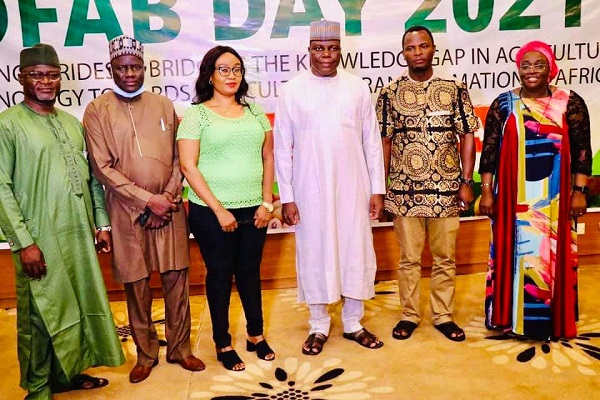
African countries hosting the Open Forum on Agricultural Biotechnology (OFAB), a project of the African Agricultural Technology Foundation (AATF), have designated September 28 as a day to celebrate strides in agricultural biotechnology recorded by various chapters of the organisation.
The participating countries are Ethiopia, Burkina Faso, Ghana, Nigeria, Uganda, Tanzania, and Kenya.
Speaking during the inaugural OFAB Day programme, themed – ‘Celebrating strides in bridging the knowledge gap in agricultural biotechnology towards agricultural transformation in Africa’, the executive director of AATF, Dr. Canisius Kanangire, said OFAB has played a big role in developing and commercialising biotechnology products.
He said Nigeria remains a key player in supporting public knowledge for pod-borer resistant cowpea that contributed to its environmental and commercial release in 2021 and was also instrumental to the commercialisation of Bt cotton, passing the Plant Breeders Act, education of decision makers etc.
In continuing its activities in the Nigeria, Kanangire added that OFAB runs the media annual award which it introduced in 2017 to recognise and award journalists across Africa for their excellence in biotechnology reporting and other efforts aimed at promoting best practices in biotechnology reporting.
The AATF boss revealed the organisation’s plan to stretch its reach to three additional countries – Mozambique, Rwanda and Malawi – where its chapters will be launched before the end of 2021 and 2022.
“AATF will collaborate with relevant stakeholders in the journey to advance agricultural biotechnology. We are willing to contribute significantly to transforming the agriculture sector and filling the gaps in other African countries,” he added.
In his remarks, OFAB project manager, Vitumbiko Chinoko, pointed out that Africa continues to be food insecure despite her enormous potentials because she is not deploying enough technology to tackle her agricultural challenges.
He harped on the need for the continent to deploy biotechnology to improve er society, even as he contended that the continent has the highest number of undernourished people.
He maintained that the fate of agricultural biotechnology needs to change because Africa cannot achieve her agenda of food security without embracing the technology, especially in the face of climate change and other abiotic stresses.
Delivering his address, the director-general of the National Biotechnology Development Agency (NABDA), Prof. Abdullahi Mustapha, said OFAB in Africa has become synonymous with biotechnology, genetic modification, gene editing and all other tools capable of enhancing agricultural productivity.
“In Nigeria, issues of biotechnology and genetic engineering were totally absent in public discuss until OFAB came to the scene. With OFAB, the country is more at home with biotechnology. No project or programme has reached out to Nigerians in the 36 states, 774 local government areas and the six geopolitical zones of the country like OFAB. From Abeokuta in southwest to Taraba and Gombe in the northeast to Kano, Kaduna in the northwest, Benue in northcentral and Port Harcourt in south-south, to Imo in the southeast etc., OFAB has taken the message of hope and agricultural revival to the doorsteps of Nigerians,” he said.
He further said OFAB has taken the heat off government in the defense of the emerging technology and its products delivering to Nigeria a well-structured platform that responds swiftly to misinformation, misrepresentation and calculated attempts to present the technology in bad light.
Mustapha thanked the AATF for the initiative and the Bill and Melinda Gates Foundation (BMGF) for funding the platform. He also thanked the programme for Biosafety Systems (PBS) and the United States Department of Agriculture (USDA) and the Nigerian OFAB family that transformed the platform into a goal-getter and a pacesetter.
Commenting on the choice of the theme, the OFAB Nigeria chapter coordinator, Dr. Rose Gidado, said OFAB was set up to actually bridge the knowledge gap between the scientific and non-scientific community, especially the general public, civil society groups and other sectors.
“Going down memory lane, the advent of agricultural biotechnology and the use of biotech in agriculture to improve crops worked in other industrialised climes and farmers tremendous gains. When it came to Africa, we became slow and policymakers were inundated with contractor information about the technology. The platform was created to correct the negative information about the technology. That gap is bridged by sharing knowledge and information and we feel we have recorded enough success stories premised on our activities. We decided to set aside a day to celebrate those gains to hoist us to the next level,” she added.


